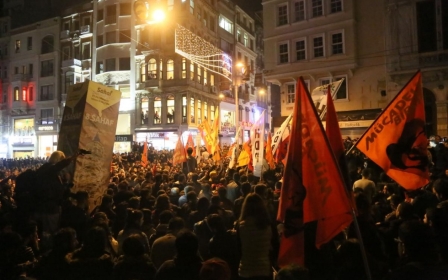Turkey in last-minute campaigning bid for UN Security Council seat

The UN General Assembly is expected to vote on the new batch of non-permanent Security Council members on Thursday, with Turkey pulling out all the stops in its attempts to secure a place in the 15-member body.
Turkey has been lobbying hard in recent months and last night held a large reception in a last-ditch attempt to lure support for its bid.
"Tonight marks the last checkpoint in our journey towards the United Nations Security Council elections for the 2015-2016 term," Foreign Minister Mevlut Cavusoglu said in New York.
If voted in, Turkey will join the five permanent veto yielding members – America, Britain, France, Russia and China – as well as 10 non-permanent members that are elected for a two-year term, with the members sharing a month-long rotating presidency.
Turkey participates in the "Western European and Others Group," in which it is competing with New Zealand and Spain. The other seats are also allocated regionally, with the General Assembly required to vote in non-permanent members by a two-thirds majority.
Turkey has been busy shoring up support for its candidacy in recent months, in particular wooing the so-called Next 11 set of countries, which are seen as up and coming emerging markets and includes countries like Mexico, Vietnam and the Philippines, as well as Turkey.
"The world is bigger than five,” Turkish President Recep Tayyip Erdogan said late last month in reference to the permanent five.
"The fate of a country should not be in the hands of the US, France, Russia, China or the UK," he added in reference to UN-mandated international intervention in Syria, which has been repeatedly blocked by Russia and China.
"A rotating system which would allow 193 member countries to be represented at the Council should be formed. There should be no notion of permanent membership; every country should have the chance to be represented."
Turkey has also been making approaches to the 48 countries, currently designated by the United Nations as the world’s least developed, pledging to step up UN support for issues like food aid, economic assistance and structural reform.
"The Istanbul Programme of Action sets the ambitious target of halving the number of LDCs to meet the criteria of graduation by 2020," Cavusoglu said, referring to a roadmap to development penned in Istanbul in 2011 as part of the fourth United Nations Conference on Least Developed Countries.
In its official brochure promoting its bid for the election, Turkey pledges to "voice the views of those which go unheard," contribute to the peaceful resolution of conflicts and peacekeeping, bolster international efforts to combat terrorism and organised crime and to play a facilitating role in regional issues.
The new non-permanent members will replace Argentina, Australia, Luxembourg, South Korea and Rwanda. The others still serving are Chad, Chile, Jordan, Lithuania and Nigeria.
Stay informed with MEE's newsletters
Sign up to get the latest alerts, insights and analysis, starting with Turkey Unpacked
Middle East Eye delivers independent and unrivalled coverage and analysis of the Middle East, North Africa and beyond. To learn more about republishing this content and the associated fees, please fill out this form. More about MEE can be found here.




